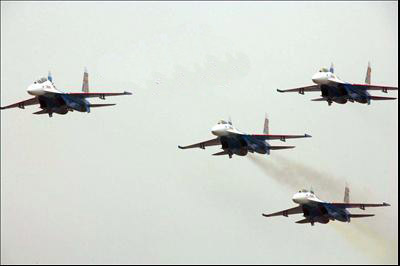
“DE-RECOGNITION” OF GEORGIA’S TERRITORIAL INTEGRITY DISQUALIFIES RUSSIA AS “PEACEKEEPER”
“DE-RECOGNITION” OF GEORGIA’S TERRITORIAL INTEGRITY DISQUALIFIES RUSSIA AS “PEACEKEEPER”
Russia has practically ceased to recognize Georgia’s territorial integrity. International organizations are as usual behind the curve in taking note of this development and drawing the conclusions from it. Russia had paid lip service to Georgia’s territorial integrity throughout the duration of the conflicts in Abkhazia and South Ossetia while in practice violating it. That pretense made it possible for Russia (with a little help from its friends) to act as “peacekeeper” and “facilitator” in those conflicts; but even the lip service has ceased recently, while overt violations of Georgia’s integrity and internationally recognized borders are becoming demonstrative and are no longer even denied.
On July 10 Russia’s Ministry of Foreign Affairs confirmed that Russian Air Force planes had flown a mission over Georgia’s South Ossetia the preceding day. A communiqué from the ministry claims gratuitously that the flight was meant to prevent a Georgian military attack on the ground in South Ossetia. It implies that the mission’s purpose was both intelligence-gathering and deterrence, and it praises the mission for achieving those goals. The communiqué credits in part the Russian “peacekeeping” troops for informing Moscow about Georgia’s alleged intention to attack (Interfax, July 10).
According to Georgian radar data, two pairs of Russian Air Force planes circled over South Ossetia between 8:00 and 9:00 P.M. local time for about 40 minutes on July 8. The four planes flew in from Russia’s North Ossetia and returned there. Georgia has protested and is recalling its ambassador from Moscow for consultations.
Moscow’s admission marks the first time in memory that it has acknowledged, and indeed claimed credit for, violating Georgia’s internationally recognized air space. As a matter of policy, Russia used to deny the air incursions, such as those over the Georgian-controlled Upper Kodori in March 2007, near the Georgian town of Gori in August 2007, and the serial flights over the Abkhaz “conflict zone” and Black Sea coastal waters in April and May of this year. During those serial flights Russian jets shot down three unmanned, unarmed Georgian reconnaissance drones, eventually crediting the nonexistent “Abkhaz air defense” for the action. Now, Moscow no longer deems it necessary (or plausible) to deny its intrusions and use of force in Georgia’s internationally recognized air space.
Routine references to Georgia’s territorial integrity have disappeared from official Russian policy statements since early this year. Those references used to be a fixture in Moscow’s statements, even if that integrity was always honored in the breach. Their disappearance is a further indication of Russia’s implicit “de-recognition” of Georgia’s territorial integrity at the level of official rhetoric, on top of the explicit non-recognition on the practical level.
Moscow now seeks to de-legitimize Georgia’s internationally recognized borders by attributing them to decisions by Soviet leaders. In continuation of this argument, the Duma’s International Affairs Committee Chairman Konstantin Kosachev declared on July 10, “Georgia is a construction that emerged in the totalitarian Soviet Union, a construction whose authorship belongs to the then-dictator Iosif Stalin.” He went on to hint that Moscow was about to open some kind of representation offices in Abkhazia and South Ossetia (Ekho Moskvy, July 10). Kosachev enjoys close relations with the Kremlin. His thesis should be chilling to Ukraine, Moldova, Kazakhstan, and other ex-Soviet ruled countries, inasmuch as Moscow can use the same argument in trying to de-legitimize their post-1991, internationally recognized borders.
The Russian “peacekeeping” commander in South Ossetia, Major-General Marat Kulakhmetov, declared on July 4 that he might request an increase in the Russian troop contingent. On July 7 the official spokesman for Russia’s Ground Forces Command stated that additional troops and army aviation might be deployed to Abkhazia if necessary. The spokesman cited a CIS authorization from 1996 for such possible action, although CIS authorizations on “peacekeeping” never had any legal value. On July 10 the commander of Russia’s North Caucasus Military District, Colonel-General Sergei Makarov, announced that his troops were exercising for possible intervention in Abkhazia and/or South Ossetia, in the event that hostilities break out there (Interfax, July 4, 7, and 10). All three officers dropped any pretense that Russian troops were operating under any rules other than Russia’s own rules as “peacekeeper” in Georgia.
Similarly disregarding any rules of conduct, Russia claims the right for its warplanes to over-fly the Abkhaz and South Ossetian “conflict zones” but denies (on penalty of shooting) Georgia’s right to fly unarmed, unmanned drones for minimal transparency there.
These latest moves are capping Russia’s presidential decree on establishing direct official relations with the Abkhaz and South Ossetian authorities (April 16), deployment of supplementary “peacekeeping” troops to Abkhazia (late April and early May), military seizure of the Georgian state-owned railroad in Abkhazia (late May), and Gazprom’s announcement of a two-year exploration project for oil and gas in “partnership” with the “Republic of Abkhazia,” onshore and offshore in the Black Sea.
Russia is overtly “de-recognizing” Georgia’s territorial integrity and internationally recognized borders. It had recognized it in previous years only in the narrowest sense that it did not pose territorial claims on Georgia. Had it posed such claims, Moscow would have disqualified itself as a military “peacekeeper” and political “facilitator” in negotiations. It has now conclusively disqualified itself through its no-longer-disguised annexation of Georgian territories.


